A fresh slate of Sundance ’08 titles were announced again today — premieres, spectrum, etc. The pop-through titles are Martin McDonagh‘s In Bruges (opening nighter), Bernard Shakey‘s CSNY Deja Vu (closing-nighter), Brett Simon‘s Assassination of a High School President, Michel Gondry‘s Be Kind Rewind, Steven Schachter‘s The Deal, Rupert Wyatt‘s The Escapist, Sean McGinty‘s The Great Buck Howard, Mark Pellington‘s Henry Poole Is Here, Sharon Maguire‘s Incendiary, Tom Kalin‘s Savage Grace, Bill Maher‘s Sleepwalking, Noam Murro‘s Smart People, Alan Ball‘s Towelhead and Barry Levinson‘s What Just Happened?.
Day: November 29, 2007
HFPA comedy/musical nominees
The Hollywood Foreign Press Association’s decision to put Charlie Wilson’s War, The Savages, Margot at the Wedding, Juno, The Darjeeling Limited, Waitress and Lars and the Real Girl into the comedy/musical category for the Golden Globes Awards is, of course, a bizarre call. Because the HFPA is committed to filling an annual slot of comedy/musical contenders, they seize upon any dramedy they can find and call it a comedy.
The general definition of a dramedy is a drama leavened with humor that is either (a) dry, (b) cryptic, (c) deadpan or (d) acid but almost never out-and-out “funny.” Juno is probably the most hah-hah-ish, although it’s very much a mainstream dramedy. Charlie Wilson’s War is a dramedy with some genuine laughs courtesy of Philip Seymour Hoffman‘s performance. The Savages isn’t even a dramedy — it’s a fairly morose drama about a dying dad and his two semi-miserable middle- aged children embroidered with, okay, some darkly witty dialogue. Lars and the Real Girl is about an absurd situation, but is not a dramedy by any standard I’m aware of. The humor in The Darjeeling Limited is so dry and deadpan it barely qualifies — I enjoyed the tone but I didn’t even chortle. Waitress, I suppose, can be called a kind of dramedy.
“Ratatouille” issue isn’t an issue
Late to the table on Michael Cieply‘s 11.28 N.Y. Times piece about Disney and Pixar wanting to push Ratatouille for Best Picture rather than the “less prestigious,” ghetto-ized Best Animated Feature Oscar. Answer: the Best Animated Feature Oscar is a very high honor and should be regarded as such. Only the very best animated films are considered so what’s the problem? The friends of Ratatouille should leave well enough alone and stay on their side of the fence.
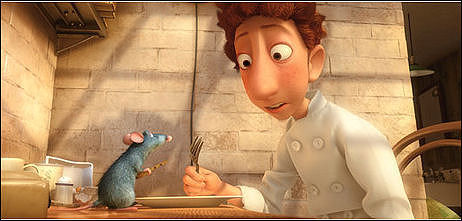
“Sweeney Todd”, David Fincher
The first Sweeney Todd L.A. media screenings are happening today — one at 4 pm, another at 7 pm — but there will be no reactions like the ones posted after last Monday’s Charlie Wilson’s War showing. The trade review date is 12.17 — Paramount is otherwise saying no reviews “until time of release.” Tongiht’s second high–voltage event is a post-screening q & a with Zodiac director David Fincher at the Arclight. Variety‘s Todd McCarthy will deliver the questions following a showing of the Zodiac Director’s Cut.
EW celebrates “Smart List”
I need to take a little credit for pushing an idea with Entertainment Weekly when I freelanced with them (’91 to ’96) that they totally ignored, but are now finally going with — a Hollywood “Smart List” that champions “the savants and the wunderkinds whose ideas are driving the film industry forward,” according to EW copy.
In ’93 or ’94 (it may even have been ’95), I sent at least a couple of faxed memos urging my then-editors (Cable Neuhaus, Maggie Murphy, Jim Seymour) to blow off the idea of putting out an annual Hollywood Power 100 list and go instead with an MVP issue — Most Valuable Players. The idea was to honor the people in the film industry who’d made the best movies, written the best scripts, introduced some valuable idea or innovation…anyone who’d moved the Hollywood legend along by doing something excellent or daring or in some way novel.
I was told at the time that Seymour (who at the time had a home on Wilton’s Belden Hill Road, only a short walk from where I lived during my Wilton High School years) was the “stopper.” He was heavily married to the Power issue and wouldn’t budge. In any case, the influence of newly arrived West Coast editor Sean Smith has resulted in EW finally going with a variation on my MVP idea…12 or 13 years later.
That said, EW‘s decision to put Judd Apatow at the top of the list is a good one. But what could have persuaded them to put Steven Spielberg — a man whose directorial innovations and pseudo-hip influence peaked 25 years ago — in the #2 slot, and James Cameron — making a 3D CG movie now, but a guy who’s basically been out of the game for 10 years — in the #3 position?
And Will Smith — a guy who’s done absolutely nothing in terms of moving the game along and stands for nothing whatsover except the fulfillment of a certain movie-star aura that leads to selling tickets and making big money — is in the fifth position? We all understand obesiance-before-power displays, but I thought the idea was supposed to be about something else.
Beale on “Blood”
Manhattan hotshot journo Lewis Beale is the latest smart guy to allow his personal feelings to get in the way of acknowledging the malignant greatness of There Will Be Blood. In his not-yet-posted Film Journal review he admits it’s “a major work from an extremely talented director that’s been “meticulously made and contains some astonishing set pieces,” and another one of Daniel Day-Lewis‘s “astonishing, burrowing-into-the-role performances.” But it “centers on a pretty reprehensible human being whose actions become less sympathetic, and more bizarre, as the story unfolds.” Beale calls it “a flawed, at times distasteful piece that will turn off as many viewers as it turns on. Is it art? Undoubtedly. Commercial? Probably not.”
Gyllenhaal vs. Namath
Michael Fleming‘s Variety story about Jake Gyllenhaal agreeing to play famed quarterback Joe Namath put me to sleep when I read it two days ago. The fact that Namath was “the first football player to find rock-star status” means zip in terms of a strong story ingredient. I remember Namath and the reports about his big-star swagger — fame, girls, money, endorsements. But nothing happened in his life that would make for strong drama.
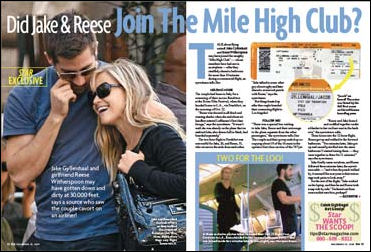
The most exciting thing that happened in Namath’s life was beating the Colts in the ’69 Super Bowl. But a win has to be more than just a win. It has to mean something above and beyond.
It is slightly more interesting, frankly, to read about the alleged mile-high incident between Gyllenhaal and Reese Witherspoon on their way back from Europe two or three weeks ago. They spent a reported 11 minutes in the first-class bathroom. I would rather see a short film about this than a feature about Broadway Joe any day.
There’s going a huge hair problem with the Namath film, by the way. For a film set in the ’60s and ’70s, Gyllenhaal will be obliged to wear something similar to an Anton Chigurh haircut. Think about that for a second.
Nichols film vs. Sorkin’s script
After seeing Charlie Wilson’s War last Monday night I wrote that I liked it, and I meant that. I said “there is edge and attitude in this Mike Nichols film — certainly irony upon irony. And it does stay with you.” I also said that if you can “kick back, chill down and enjoy what’s awfully well-crafted and efficient about it (which isn’t hard), you’ll be fine with it too.”
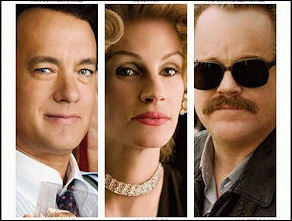
But the honest fact is that I like Aaron Sorkin‘s 5.25.05 version of his Charlie Wilson’s War script somewhat more.
I don’t know how much of Sorkin’s script Nichols actually shot, but it’s been said that Nichols cut, re-cut and then re-cut some more, and then did some extra shooting. Nichols’ game plan, in any case, seems to have been to water down the explicit political references and generally play up the charm and the heroism (while toning down the irresponsible boozing) of Tom Hanks‘ Charlie Wilson character.
The final version of Charlie Wilson’s War runs 97 minutes with credits, and Sorkin’s ’05 script runs 145 pages. Based on the page content, it’s obvious that the movie has been shaped in order to be less complex, much more upbeat and explicitly depoliticized, which to say scrubbed clean of all specific Al Qeada and 9.11 mentions.
If each scene in Sorkin’s 145-page script had been shot, the film would have at least run a solid two hours, or roughly 20 to 25 minutes longer. (Nichols shot the film at a fast pace, like a comedy, so figure less than a minute a page.) The finished film tells the same basic story, but it contains only about 70% of the material that Sorkin put to page.
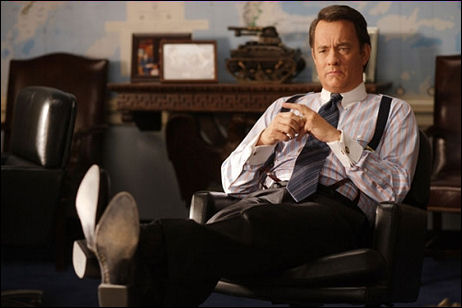
The script reminds you that Sorkin is a fine screenwriter and a seasoned pro — he knows how to make a script tight and fat-free and tell a good story. And I just feel that what he wrote two and a half years ago is a denser, darker and more explicit thing than the film. I’m not putting Nichols’ movie down — it’s fine for what it is. I just wish he’d used more of Sorkin’s material.
I also wish Nichols hadn’t tried so hard to make Wilson, a real-life Texas Congressman who in the late ’80s almost single-handedly arranged to supply the Afghanistan Muhjadeen with arms that led to the defeat of the Russian invaders, into such a red-white-and-blue hero.
The movie begins and ends with Hanks being given an award for his valiant efforts along these lines, and I have to say that this scene feels over-sold, as if there was a determination to make sure the audience understands that Charlie Wilson’s War is an “up” movie about a true American patriot, which it mainly is. It just seems as if this was done to make sure audiences wouldn’t interpret the film as another left-liberal downer movie about the negative effects of American intervention in the Middle East.
Nichols and the producers were, I’m sure, particularly afraid of saying too explicitly that in helping the Muhjadeen we might have helped stir the pot and sew the seeds that led to the 9.11 disaster. Too dark, muddled and accusatory — better to serve up an amiable patriotic comedy that won’t alienate the moviegoers who’ve been avoiding Middle East flicks like the plague over the last couple of months.
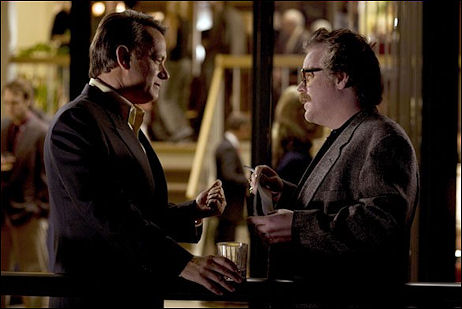
There’s no “congratulations, Charlie!” scene at the beginning and end of Sorkin’s script, for one thing. And while Nichols ignores it, Sorkin depicts a drunken hit-and-run accident that Wilson actually got into in Washington, D.C., right before a second visit to Afghanistan refugee camps. (In the film the trip happens in order to persuade Ned Beatty‘s white-haired U.S. Senator character, Doc Long, to vote for funding the arms shipments.)
In a briefing scene on page 107 attended by Wilson and Phillip Seymour Hoffman‘s Gust Avrakatos, a “briefer” makes an explicit reference to an anti-Soviet fighting group in Afghanistan “that we like… funded by a wealthy Saudi aristocrat. They call themselves The Base, which translates in Arabic to Al Qeada.” I’ve only seen the film once, but I don’t remember hearing this line in Nichols’ film.
And there’s a longer version of the scene between Hanks and Hoffman on the balcony when Gust reviews the possible blowback consequences of having shown a bunch of undeducated, “off-the-charts stupid” people who don’t get the New York Times delivered to their doorstep (and therefore won’t, he predicts, understand down the road that we helped them kick the Russians out of Afghanistan) how to take on a super-power.
Nichols’ film doesn’t ignore the after-effects of our Afghanistan intervention. The film says that in the end “we fucked up the end game.” It just plays down the specific 9.11 echoes.
At the very end of Sorkin’s script there’s a three-page epilogue that takes place in Charlie’s D.C. apartment on the morning of 9.11.01 — a scene absent in Nichols’ movie. We can tell that it’s several years later by Charlie looking grayer, being married and talking about being sober. He’s pouring coffee as he talks to his off-screen wife when the building is rocked by a loud boom. Charlie goes out on the balcony and sees that the Pentagon is burning. The phone rings and his wife picks up. She tells Charlie, “It’s Gust…he says to turn on the TV.”
